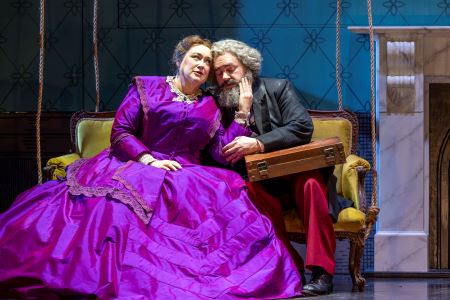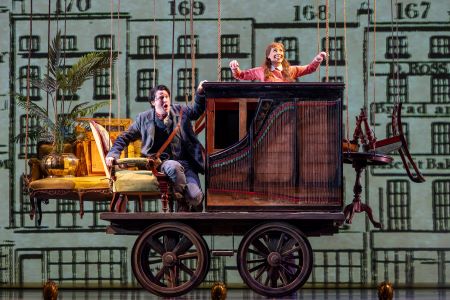An opera about a day in the life of Karl Marx doesn’t exactly sound like a barrel of laughs. But then so much of Jonathan Dove’s witty 2018 work proves that things are not always what they seem, whether that’s through Dove’s jaunty score-writing, Charles Hart’s ingenious libretto or Jürgen Weber’s drolly imagined scenario.
The setting is 41 Maitland Park Road, London, where Marx moved to in 1875 with his wife and one of his daughters, and where he would spend the remainder of his life. The opera follows Marx and his family over a course of 24 hours on a summer’s day, which sees various farcical events unfold, including Marx’s possessions being taken from his house on account of a failure to pay his creditors; his illegitimate son showing up at the door; Marx attempting to pawn his formerly aristocratic wife’s family silver; Marx being questioned by the police over the theft of said silver (how could a lowly German refugee have legitimate access to such riches?); Marx trying to sleep with the housekeeper; Marx winning a much needed suitcase of cash in the pub by delivering a rousing speech on the merits of communism then immediately blowing it all by buying everyone a round, and Engels showing up and saving the day by clearing his old pal Karl’s debts (again). Oh, and this is all while being spied upon.
In what was the opera's UK premiere, Roland Wood proved perfect in the role of Karl Marx as he expertly portrayed the character’s serious sense of self importance combined with his gentle buffoonery with his rich, commanding baritone. Rebecca Bottone (pictured below) as Marx’s youngest daughter has a marvellously high soprano; she needed a little bit more control over her intonation in some of the faster coloratura sections at the start, but her high register in her more gentle passages in Act Two was rather lovely, and she exuded all the wild-eyed excitement of a 16-year-old girl discovering the world. Irish soprano Orla Boyan (pictured above with Wood) has quite the presence as Jenny Marx, nee von Westphalen, as she laments her former nobility over copious amounts of gin with her housekeeper Helene, here sang by performer and producer Lucy Schaufer. The comic timing in their duet always landed; it’s quite a skill to appear both that drunk and that in control!
Character tenor Alasdair Elliott made quite the entrance as Engels as he sails in on a penny farthing bicycle, complete with angels’ wings, and Jamie MacDougall's spy pops up in various guises including a particularly clever one in Act Two, which I won’t spoil.
The chorus was also excellent. An ensemble scene at the end of act one shows Marx’s dream of individuals coming together to create a whole greater than the sum of their parts. A few activists from throughout the ages were peppered amongst the singers’ Victorian costumes; a suffragette, a 70s style hippy, a nurse in scrubs demanding fair pay. More perhaps could have been made of this, but it’s a minor point. The singing is what matters, and here it was outstanding.













Add comment